Hey,
During World War 2 and FDR’s drafting of the Lend Lease Act, how was he able to convince the public / isolationists to accept such a war-active act so early after World War 1? What are the different schools of thoughts on the topic? Are there any books you suggest I purchase on the topic?
—BH
? ? ?
Dear BH,
The Lend-Lease Act was introduced on January 10, 1941 and passed on March 11 following two months of congressional debate, pitting advocates such as Secretary of War Henry Stimson against isolationists such as Robert Taft, Hamilton Fish and Charles Lindbergh. In the end, Act H.R.1776 (a number chosen for emotional impact) was passed by a virtually solid Democrat vote as well as Republicans who were starting to see isolationist arguments as unrealistic and the prospect of war against Adolf Hitler as inevitable. That process had really begun after Hitler invaded Poland in September 1939, after which the Neutrality Act was altered from a complete embargo on American weapons to an agreement to sell arms on a cash and carry basis, for transport aboard foreign flagged ships (the later stipulation of which clearly favored Britain and France over Germany).
http://www.archives.gov/exhibits/treasures_of_congress/text/page20_text.html
Lend-Lease changed the cash-and-carry stipulation to aid a Britain whose treasury was by then all but exhausted.
http://history.house.gov/Historical-Highlights/1901-1950/The-Lend-Lease-Act-of-1941/
http://www.ourdocuments.gov/doc.php?flash=true&doc=71
http://www.encyclopedia.com/topic/lend-lease.aspx
For more details, you might want to consult Lend-Lease Act (1941): a DocNotes Analysis, by Mark R. Wilson, or Most Unsordid Act: Lend-Lease 1939-1941, by Warren F. Kimball
Sincerely,

Jon Guttman
Research Director
World History
www.historynet.com
More Questions at Ask Mr. History
Don’t miss the next Ask Mr. History question! To receive notification whenever any new item is published on HistoryNet, just scroll down the column on the right and sign up for our RSS feed.





